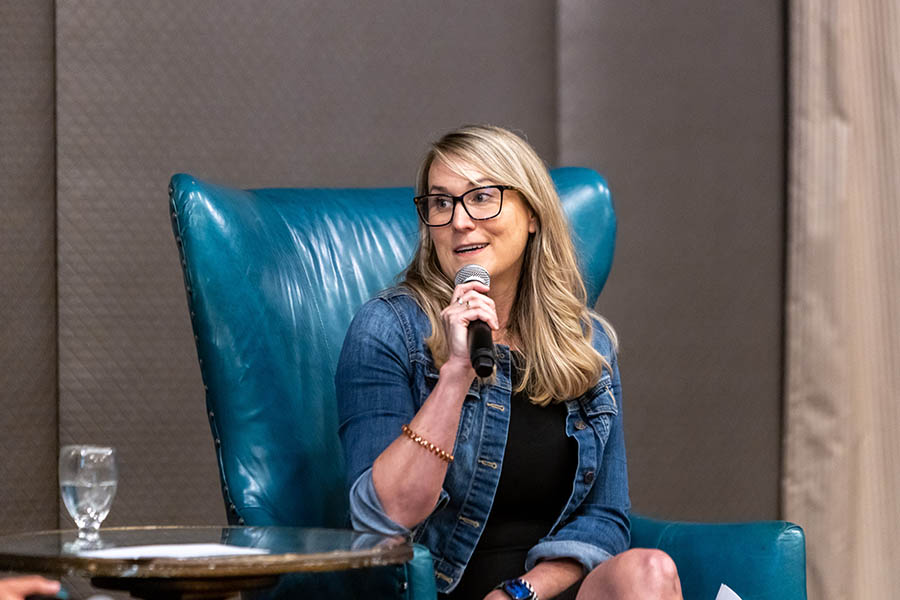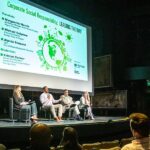Wide-ranging panel discussion preceded the announcement of the 100 Best Green Workplaces in Oregon 2023 winners.
Winners of the 100 Best Green Workplaces in Oregon 2023 gathered Thursday morning at the Sentinel Hotel Portland for an event honoring the organizations on the list.
Attendees enjoyed coffee, pastries and a panel discussion on corporate social responsibility, featuring the following panelists:
- Karin Power, former state representative;
- Vivian Satterfield, chief sustainability officer, Portland Bureau of Planning and Sustainability;
- Jules Bailey, president and CEO, Oregon Beverage Recycling Cooperative.
Kristen Connor, senior vice president and community impact officer at Heritage Bank, moderated the discussion.
The panel discussion ran for a little more than an hour, with topics ranging from the urban-rural divide, finding reasons for optimism amid political gridlock — and how New Jersey residents feel about New York City.

On the importance of awards like the 100 Best Green Workplaces: “It’s been a really challenging time all around, not just in sustainability. It’s from the pandemic, from social issues happening. We’ve had a number of opportunities to rise to the occasion of the challenges that we face. Sometimes those competing priorities become a bit overwhelming in sustainability, I think sometimes can get a little lost in the focus of that. So congratulations to the organizations in this room whose employees feel that what your companies are doing are meaningful, and that they feel like they’re important, and they feel like they’re engaged in those because I think that that’s a huge success and a win for you.” – Kristen Connor

“I think there’s a time disconnect between government and business, which is why it’s so important to have awards like these, frankly — so that you have markers to hold your business up to in cohorts together. It really matters for employees to take pride in more than what they produce or do but how they come together, and the kind of community you create each of your organizations.” – Karin Power

On elevating sustainability in the current moment: “We’ve got a lot of competing pressures on us, from government and the economy and health care, the pandemic and all these different things; it’s easy to kind of have sustainability down a notch always. But you know, the secret is, it’s always been that way. I remember 14, 15 years ago, when I first ran for office, and I was knocking on doors and in inner Southeast Portland, and if there was ever a neighborhood that cared about sustainability, it’s there…What I heard from people was, they were worried about their kids’ education, they were worried about the economy and where their job were going. They were worried about how they were going to pay the bills. And yeah, they were worried about sustainability and environment. But it wasn’t necessarily, if you ask them about it, top of mind, they’re like their highest concern on kind of their individual Maslow’s hierarchy. I think that that’s true across the economy, as well. I think everybody acknowledges that it’s really important, it just always ends up getting a little bit second billing. Part of the solution to that is, there has to be a, a vision of sustainability, that, that meets people’s needs where they are, and shows people that it’s actually part of the fundamental underpinning of everything else, as opposed to being something separate.” – Jules Bailey

On the relationship between environmental justice, economic justice and racial justice: “I grew up with lead paint on my walls and lead pipes in the water, and those weren’t replaced until I had already developed and grown in my life. So there is no ability to silo economic justice, from environmental justice from racial justice, and I have always strived my work to work in the sweet spot of those the intersection of those three things. When we think about how to elevate issues of sustainability and elevate the issues of the environment for the most impacted communities it’s what’s right in front of you: the ability to afford food and dignity and being able to have access to opportunity. Underlying that, it’s all these other things. So I think the ability to work in the diversity of all these different issues is making impact towards this overarching goals sustainability. And when things get tough — I just want to acknowledge that we’ve already done a lot of the big-ticket items, so now we are working on the toughest shit, truly. It is going to be hard because this is complicated. It is not straightforward.” – Vivian Satterfield




